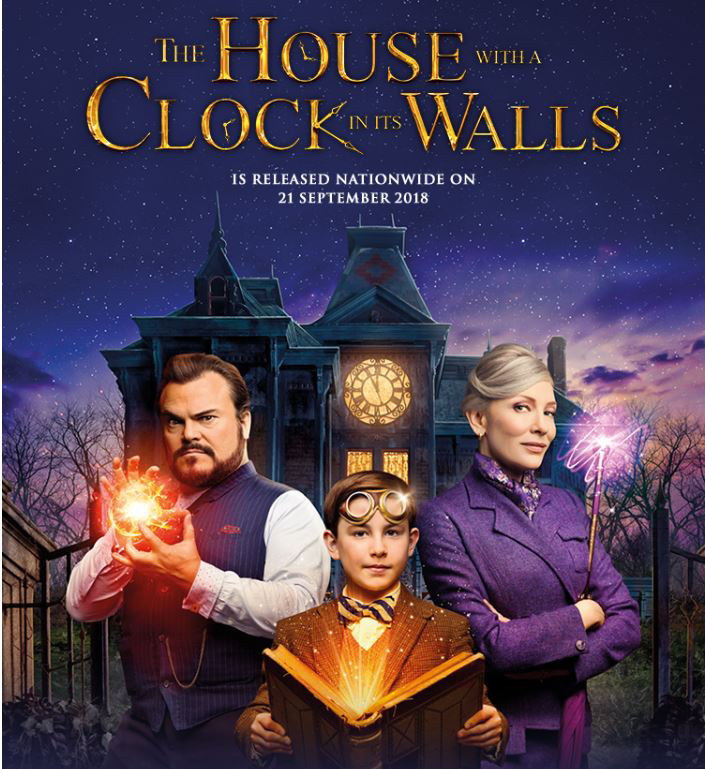
The film is based on a novel series by John Bellairs. Bellairs was an American author, who was most notable for his gothic mysteries, and this film holds fast to that (albeit more gothic than mysterious). At first, though, it’s hard to tell whether the production team is most earnestly placing its focus on the gothic, the mystery, the fantasy, the horror or the comedy. The woman seated across from me, for example, gasped when Eli Roth’s name appeared as the director of the film. Her incredulity was amusing but not necessarily misplaced. Roth’s directing career is most notable for horror films, which tend to be very adult oriented. “The House with a Clock in Its Wall” is a departure.
Like many fantasy films before it, the film centres on an orphan. Lewis is a 10-year old boy whose parents have recently died. And like every orphan in the history of literature and film his completely normal life is upended when he is forced to go live with a zany distant relative. In this case, it’s his uncle Jonathan, an ostensible parlour magician with a house that seems more sentient that one would like. Lewis gets two zany caretakers for the price of one, for his uncle is constantly joined by Mrs Zimmerman, his zanier next-door-neighbour. The two snap at each other like the main couple in a screwball film, providing Lewis with constant amusement. Lewis’ story is not merely one of adaptation, though. For this is a fantasy film. Or a mystery film. Or a horror film. Or some weird amalgamation of all three.
The central mystery, which the title alludes to, rests on a mysterious clock put somewhere in the house by its previous owner, Jonathan’s former friend and a powerful warlock, who has plans to destroy the world. The particulars of the mystery seem strangely inessential to the film, though. What is essential is that Roth and screenwriter Eric Kripke’s desire to flirt with as many genres as possible in giving us a children’s fantasy that privileges earnestness over cynicism. Even Roth and Kripke seem more interested in marking time and observing the weirdness of their characters than in solving great mysteries. And, so, the most effective scenes become peripheral ones, hinging on characters enjoying each other company rather than on ones that move the plot forward.
It’s probably the lack of cynicism that makes the film seem most out of place in 2018. There are moments where Roth wields his ability to evoke horror excellently, and the production design on the house cultivates a sense of gothic unease with relish but the film, for all its dark undertones, exudes a quality of sincere goodness that is hard to upend. A lot of this depends on the actors, particularly Jack Black and Cate Blanchett as Uncle Jonathan and Mrs Zimmerman. The two strike just the right tone of adults exasperated and amused by each other with a sincere interest in saving a child from the darkness of the world. The film’s constant references to “the war” (World War II) become slightly heavy-handed but in its own vague way is the closest thing the film gets to acknowledging the dismalness of the real world without ever getting there.
Otherwise, the film is an exuberant, frenetic, unbridled leap into silly, fantastical fun. Owen Vaccaro as the young Lewis is perhaps more functional than outstanding, but he projects just the right air of honest-goodness for his performance to work. There’s a sense at the end of “The House with a Clock on its Walls” that the central mystery/adventure ends up coming off as more negligible than one would expect, which a few critics have commented on. Indeed, the film seems to be building to a climax that seems oddly small when it comes. Still, it’s a sign of the film’s privileging of its own congenial sweetness over anything else. It does emphasise the way it seems like something out of place against the current films in theatre, which hinge on their morbidity or cynicism and their big stakes. But, it’s a mostly satisfying and sweet escape into fantasy.
“The House with a Clock in Its Walls” is currently playing at the Princess Movie Theaters and Caribbean Cinemas Guyana.
Email your thoughts to Andrew at almasydk@gmail.com or follow him on twitter at DepartedAviator.

